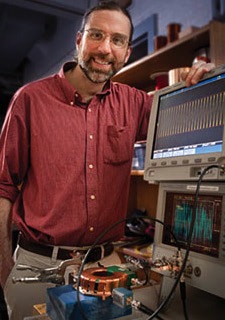- Undergraduate
Bachelor's Degrees
Bachelor of ArtsBachelor of EngineeringPartner School Dual-DegreeUndergraduate AdmissionsUndergraduate Experience
- Graduate
Doctoral Degrees
Doctor of PhilosophyPhD Innovation ProgramDoctor of Medicine-PhDGraduate AdmissionsGraduate Experience
- Research
- Entrepreneurship
- Community
- About
-
All Thayer News
Professor of Engineering Charles Sullivan Named 2014 IEEE Fellow
Dec 02, 2013
Dartmouth Professor of Engineering Charles Sullivan has been elevated to Fellow by The Institute of Electrical and Electronics Engineers (IEEE). Professor Sullivan is being recognized "for contributions to the design of power electronic circuits and magnetics."
“Power electronics is the glue that holds together all the different parts of an energy system,” says Sullivan. “[For example,] it’s what interfaces between the solar panel and the grid, between the grid and the device that uses energy.”
His research on power electronics—the use of semiconductor devices to control energy precisely and efficiently—draws upon many different disciplines, including control theory, circuit theory, and electromagnetics.
“Magnetics is the part of power electronics that is the most challenging,” he says. “[The components] are expensive, large, and have a high power loss...Integrated circuit companies are making electronics smaller and cheaper all the time, but this doesn’t include the components that are unique to power electronics.”
Sullivan’s research group has developed widely used models that accurately predict power loss in conventional magnetic components and is developing new ways to reduce the loss, including "working in Thayer’s micro-fabrication lab to deposit new magnetic materials that have lower loss at high frequencies."
His research also applies to power converters for renewable energy systems. New power sources such as fuel cells and photovoltaic systems produce DC power, but most appliances, and the power distribution grid, all require AC power. The power electronics to convert DC to AC—inverters—not only convert the form of the power but also control the flow of energy, optimizing the performance of the power source.
“We want to make inverters as efficient as possible so that we don’t lose energy during that conversion process,” he says. “We want to make them inexpensive, small, light, and convenient to install.”
Sullivan received his B.S. in electrical engineering from Princeton University, and a Ph.D. in electrical engineering and computer sciences from the University of California at Berkeley. He has worked as a power electronics design engineer for Lutron Electronics Company and has published two textbook chapters and over 145 technical papers in magnetics, power electronics, electric machine modeling and control, and energy efficiency. He holds 31 patents, and was the recipient of a National Science Foundation CAREER award in 1999. His teaching interests include analog circuit design, power electronics, system theory and control, engineering design, and energy efficiency.
The grade of Fellow is conferred by the IEEE Board of Directors upon a person with an outstanding record of accomplishments in any of the IEEE fields of interest. The total number selected in any one year cannot exceed one-tenth of one-percent of the total voting membership. IEEE Fellow is the highest grade of membership and is recognized by the technical community as a prestigious honor.
The IEEE is the world’s leading professional association for advancing technology for humanity. Through its 400,000 members in 160 countries, the IEEE is a leading authority on a wide variety of areas ranging from aerospace systems, computers and telecommunications to biomedical engineering, electric power and consumer electronics.
For contacts and other media information visit our Media Resources page.

